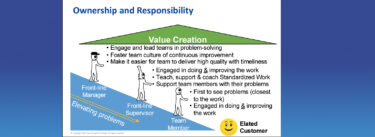Why is kaizen so powerful? We intuitively understand that engaging all people all the time in improvement has to be good for morale and that, no matter how hard some managers try to ignore it, morale affects results (considerably). History is replete with battles where morale trumps numbers. But I often find it hard to explain how humble “100×1% is better than 1×100%” kaizen can actually impact the bottom line of a large company, and even change its strategic trajectory.
Masaaki Imai, who introduced kaizen to the West, explained that any investment’s return will tend to degrade over time, due to aging and ill-use. It’s through kaizen that old investments are kept “fighting fit” and new investment is only focused on new tech or new processes. As a result, the gap between a kaizen company and a non-kaizen company will widen over time. I can’t argue with this, as I saw in Toyota Brazil a 1937 stamping press in mint condition still making parts for the Corolla.
But perhaps kaizen mind goes far beyond keeping all equipment running (and saving ourselves capacity, and hence cash, in the process). A couple of years ago I was kindly invited to a sumptuous lunch by corporate executives in their lavish headquarters C-class private restaurant. Lunch was okay, the conversation superb, and their interest in Lean genuine. Still, I walked out perplexed, as it was hard to see these cats going for “kaizen mind.” Soon thereafter, a low cost competitor attacked the market, and the world changed for that company, who quickly found itself managerially incapable of adapting. Instead, they became one of those disaster business cases we professors describe to students with barely contained schadenfreude.
Rent-seeking behavior is about spending capital (political or physical) in increasing’s one’s share of existing wealth without actually creating wealth. Ostentatious corporate headquarters are a typical example of this as senior leaders spend on themselves (justifying no doubt as good “image”), in turn distancing themselves from their workforce and, in the end, taking cash away from either customers (you can always lower your prices) and/or what would be an investment in the next generation of products.
Nobel-prize winning psychologist Daniel Kahneman, author of Thinking Fast and Slow, explains success as TALENT + LUCK. Great success as a little more talent + a lot of luck. I’m sure you feel (as do I) “hard work” should be added to the equation but, the more I see diverse situations the more I have to accept the truly contingent nature of success: a few guys are at the right place at the right time, and bingo! And as their venture succeeds, and millions start rolling in, these early innovators find themselves suddenly surrounded by a lot of people ready to spend all that cash on a worthwhile venture and, eventually newer better corporate headquarters (usually about the time the company is no longer in the right place and times have changed). External change is often faster than internal change.
The “halo effect” of success creates the illusion that whatever these successful guys do—whether they stand on their heads every morning or adopt a raw food diet—this is seen as a secret to their success. Of course, when they’re no longer successful, these very same quirks become explanations for their failure.
Genchi genbutsu and “kaizen mind” turn out to be unexpected antidotes to the temptations of spending money on oneself as opposed to looking for ways to increase value. I was recently in a company where the CEO scrubbed the multi million plan to build a new site because he saw kaizen opportunities in his existing site and chose to first pursue those before investing. Spending time on the shop floor listening to team members’ ideas of how things could be done to do better with less is also a sobering experience.
Kaizen mind doesn’t just affect the use of investment by keeping current processes up and running. It also influences what kind of investments you make. For example, perhaps you invest in a smaller, more flexible machine rather than a complex, expensive one. A more just-in-time process rather than a new warehouse to hold finished goods. A more robust process rather than a quick win on purchased parts cost reduction. By focusing daily on customer value, people competencies (and the obstacles that prevent people from doing good work), and eliminating waste, leaders have less mental space for grandiose projects. As a result, they devote more of their attention to pursuing real, already existing opportunities for kaizen.
Clearly, kaizen (and kaizen mind) is a powerful way to engage people. It’s also a great way to get more out of existing investments. Kaizen, it turns out, is also a powerful way to identify and frame investment decisions while orienting senior leaders away from rent-seeking path of least resistance choices towards real value-seeking explorations. If success is the result of talent and luck, kaizen mind both leverages talent and makes its own luck.






